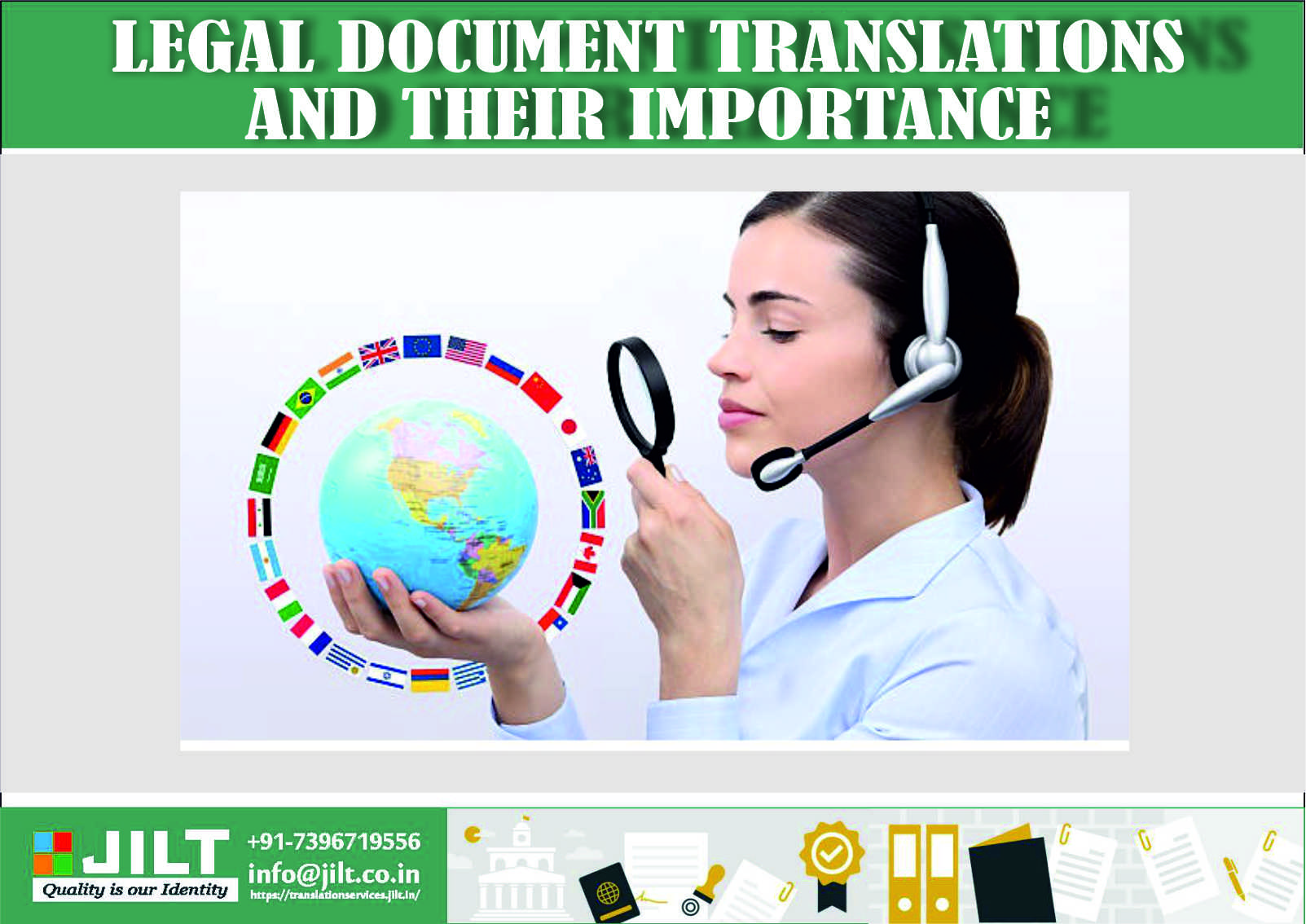
LEGAL DOCUMENT TRANSLATIONS AND THEIR IMPORTANCE
by Dr. Abu Mazhar Khalid Siddique - January 06, 2024
In the dynamic landscape of international business, effective communication is paramount, especially when dealing with legal matters. This article delves into the intricate realm of legal document translation, recognizing the nuanced complexities that arise when not handled with utmost precision. For any business professional engaging with a diverse clientele or collaborating with global industry experts, the inevitability of encountering legal documents in foreign languages is evident. The burgeoning demand for legal document translation is a direct consequence of this globalized business environment. This comprehensive blog serves as an invaluable guide, elucidating the critical nuances, protocols, and considerations involved in the meticulous process of translating legal documents. As businesses navigate through diverse linguistic landscapes, understanding the intricacies of legal document translation becomes imperative for seamless cross-border transactions and effective collaboration on an international scale.
Legal document translation is not merely a linguistic task but a fusion of language proficiency and legal expertise. It demands an astute understanding of legal terminology, jurisdictional nuances, and cultural sensitivities. Professionalism in this domain is non-negotiable, as inaccuracies or misinterpretations could have far-reaching legal implications. From contracts and agreements to patents and court documents, the scope of legal document translation is expansive. The blog illuminates the significance of engaging qualified linguists who possess not only linguistic prowess but also a profound comprehension of the legal frameworks involved.
The piece goes beyond a mere acknowledgment of the growing demand for legal document translation; it offers practical insights into what businesses and individuals need to know when seeking such services. From selecting the right translation professionals to understanding the certification requirements for translated legal documents, the blog provides a comprehensive roadmap for navigating the complexities of this specialized field.
Legal document translation
A meticulous process of converting material from one language to another, is a critical facet of international communication, particularly in the legal arena. These documents, ranging from financial statements to crucial legal evidence, hold immense significance and demand an exacting level of precision to preserve the original meaning. At the core of this specialized task is the requirement for legal translators with a profound understanding of law jargon, transforming legalise—a language in itself.
Legal documents encompass a diverse range of materials, each posing unique challenges to translators. From contracts and court transcripts to confidentiality agreements and immigration documents, the breadth of legal translation is extensive. The intricacies involved in translating documents like trusts, wills, and birth certificates underscore the importance of linguistic precision and an intimate knowledge of legal intricacies.
Legalise is like a language on its own, and your legal translator needs to have a background in law. Moreover, the translator must know both countries’ laws before working on any document. This is because, in law, some words do not represent the original meaning. Plus, legal translators should know the significance of the documents they are translating.
Legal documents and materials need a translation include the following:
Contracts
Depositions
Court and witness transcripts
Trusts and wills
Complaints
Confidentiality agreements
Immigration documents
Birth certificates
Proposals
Licenses
Policies
Legal statements
Legal disclaimers
Litigation documents
Skills Required for Legal Translation
In the ever-expanding global landscape, the demand for legal translation has surged, fueled by the internationalization of businesses and increased cross-border interactions. As this demand intensifies, the requisite skill set for proficient legal translators becomes increasingly nuanced. Here, we delineate the indispensable skills that elevate a translator to excel in the intricate domain of legal translation.
Knowledge of the Legal System: A foundational requirement for legal translators is a comprehensive understanding of the legal system. Possessing legal knowledge not only expedites the translation process but also minimizes the risk of misinterpretations. A translator well-versed in legal nuances can discern the significance of terms, ensuring accurate and contextually relevant translations. This knowledge extends to an understanding of courtroom procedures, enabling the translator to deliver precisely what attorneys and legal professionals require.
Maintaining Exact Meaning: Preserving the exact meaning of legal documents is paramount. Legal translators must possess the linguistic prowess to convey statements, clauses, and details accurately. Native speakers of the language are advantageous, but adept learners of the target language can also excel with a deep understanding of semantics and linguistic subtleties.
Legal Experience: While legal knowledge forms a foundation, practical legal experience adds a valuable dimension. Translators with hands-on experience in the legal field bring a nuanced perspective to their work. This experience not only enhances the accuracy of translations but also equips translators to navigate the intricacies and pressures associated with legal contexts, contributing to more effective and reliable results.
Adherence to Framework: Legal translation follows a structured framework that must be meticulously adhered to without compromising the original meaning. The translated material should mirror the structure, topics, and issues of the source document. A profound command of the language, coupled with an unwavering commitment to maintaining the document's integrity, distinguishes a skilled legal translator.
Research and Writing Proficiency: Exceptional writing skills are imperative for legal translators. The ability to convey accurate meanings, coupled with a robust legal vocabulary, ensures that the translated content is precise and contextually appropriate. Additionally, adept research skills are equally crucial, allowing translators to delve into legal intricacies and ensure accuracy in their translations.
Confidentiality Maintenance: Recognizing the inherently sensitive nature of legal documents, a competent legal translator must prioritize confidentiality. This extends beyond linguistic proficiency to include signing non-disclosure agreements and upholding the principles of attorney-client privilege. Maintaining an unbiased and discreet approach is essential to instill trust in clients seeking translation services for confidential legal materials.
The Importance of Legal Documents Translations
In the contemporary global business landscape, where companies seek to expand their reach and establish a presence in international markets, the importance of reliable translations cannot be overstated. Transcending language barriers, translations serve as the conduit for sharing critical information with partners across borders. Within this realm, legal document translation emerges as a pivotal component, playing a crucial role in facilitating seamless international business operations.
Here are several compelling reasons underscoring the significance of legal document translations:
Facilitating Strategic Business Planning: Accurate translations form the bedrock of a sound business strategy. Given the complexity of legal concepts, language barriers can obscure crucial details. A proficient legal translation service is instrumental in ensuring a comprehensive understanding of legal nuances, providing businesses with a clear overview of future legal requirements and potential challenges. This clarity is essential for formulating effective and informed business plans.
Preserving the Original Meaning of Legal Terms: Engaging the services of an expert translator is paramount. A highly skilled professional possesses the ability to accurately interpret legal documents in the target language, ensuring that the translated content mirrors the original document seamlessly. This fidelity to the original meaning is essential for maintaining the integrity and precision of legal terminology.
Adherence to Unique Legal Document Formats: Legal documents adhere to specific patterns and formats. From legal disclaimers to amendments, each document type has distinctive features that demand meticulous translation. Translators with a background in law are adept at recognizing and preserving these formats, thereby detecting any inconsistencies and rectifying them. The expertise of a professional translator becomes indispensable in maintaining the structural integrity of legal documents.
Superiority Over Machine Translation: While automatic translation services such as Google Translate may offer a quick and cost-free solution, they often fall short in terms of accuracy and capturing language intricacies. Legal document translation services, manned by human professionals, provide accurate and nuanced translations that do not compromise the original meaning or tone. In the realm of legal translations, the precision offered by human experts far surpasses the limitations of machine translation services, justifying the investment in professional language translation services.
In conclusion, the field of legal translation is intricate and subtle, making accuracy crucial. Professional legal translation services are essential for organizations because to the complex nature of legal terminology and the seriousness of the ramifications that can result from even a single mistranslation. An skilled legal translator, who is fluent in both the target language and the relevant legal systems, is a priceless asset in such a situation.
An incorrect choice of words can change the entire meaning of a paragraph or document, which might have far-reaching legal consequences, hence accuracy is of the utmost importance in legal translation. Successful translators in this complex sector are native speakers of the source and target languages and have extensive legal training. The proper transmission of legal intricacies while maintaining the original document's integrity and intent is guaranteed by this dual proficiency.
To sum up, legal translation services are essential for companies who want to do business in global markets because they help with communication and help you avoid legal problems. When translating legal papers, it is crucial to have a translator with both language fluency and experience in the field to avoid common mistakes and accurately represent the original intent of the document's legal meaning.
Our organization employs native-speaking translators who can provide certified translation services in any language. We provide translation services in English (Urdu), Arabic (Spanish), German (French), Persian (Iranian), French (Italian), Japanese (Korean), Russian, and any other Indian or local language. Expert proofreaders at our company will inspect the translation. We also provide a courier service to deliver completed documents to our clients.
- Also Read :- HOW TO APPLY AND GET A BIRTH CERTIFICATE ONLINE BY SITTING AT HOME
- Also Read :- A COMPREHENSIVE STUDY FOR TRANSLATION INDUSTRY STATISTICS
- Also Read :- DOCUMENTS REQUIRED FOR PURSUING THE CASE OF DEATH COMPENSATION IN PUBLIC COURTS OF SAUDI ARABIA
- Also Read :- CHALLENGES OF FINANCIAL TRANSLATION AND SOLUTIONS TO ADDRESS THEM
- Also Read :- THE MOST IMPORTANT DOCUMENTS THAT REQUIRE BUSINESS TRANSLATIONS
- Also Read :- HOW TO MAKE AN SEO-OPTIMIZED MULTILINGUAL BLOG ?
- Also Read :- Academic transcript translation (JILT - Certified Translation Services)
- Also Read :- Journals Document Translation Services
- Also Read :- AWARENESS OF THE LEGAL DOCUMENTS TRANSLATION SERVICE.
- Also Read :- HISTORY OF SPANISH LANGUAGE
Search
Categories
Archives by Month
Popular Blog
QUICK TRANSLATION QUOTE
Need help with a translation?
Get in touch with us
Whether you have a specific project you want to discuss, need a translation quote or simply want to discuss your requirements, do not hesitate to get in touch with us.











Social Networks